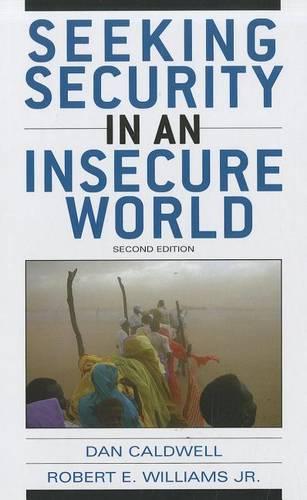Overview
Now in a thoroughly updated edition, this comprehensive yet concise introduction to international security explores the constantly changing conditions that lead to an insecure world. The text offers a broad overview of both traditional and ""new"" conceptions of security. With clear and lively prose, compelling examples, and solid scholarship, it engages both students of international relations and general readers who wish to gain a better understanding of what security means today and how it can best be achieved.
Full Product Details
Author: Dan Caldwell ,
Robert E. Williams, Jr.
Publisher: Bloomsbury Publishing Plc
Imprint: Rowman & Littlefield Publishers
Edition: 2nd Revised edition
Dimensions:
Width: 16.30cm
, Height: 2.90cm
, Length: 24.00cm
Weight: 0.667kg
ISBN: 9781442208032
ISBN 10: 1442208031
Pages: 330
Publication Date: 10 June 2011
Audience:
College/higher education
,
Tertiary & Higher Education
Format: Hardback
Publisher's Status: Out of Print
Availability: Awaiting stock

Reviews
PRAISE FOR THE FIRST EDITIONIn an age that's insecure not only about future threats but also about the very definition of security in this rapidly changing world, Caldwell and Williams offer a powerful way of seeking much better answers. They argue that, just as national economies have become increasingly globalized, so too must national thinking about security give way to more globalized perspectives. Reading this book convinces one that whatever might actually work to make our world more secure is sure to prove nothing like we have ever tried in the past. This is a timely and hugely important contribution to smart thinking about national and international security.--Tom Plate
In this second edition of their well-received survey (1st ed., CH, Dec'06, 44-2361), Caldwell and Williams (both, Pepperdine Univ.) offer an exceptional overview of international security challenges and the status of threats to both states and individuals. Seeking Security in an Insecure World is a sober reminder that while the threat of interstate war has severely diminished in the developed world, developing nations remain plagued by political instability, civil wars, crime, infectious diseases, and persistent environmental challenges. The transnational nature of these problems has led to a progressive securitization of issues not previously perceived as part of a dynamic threat environment, and necessitates that state-centered security paradigms give way to new realities--including the fact that human security is very often threatened by the very states responsible for its assurance. This updated book is a measured and comprehensive appraisal of the contemporary security environment. While the authors offer advice and suggestions for policy moving forward, the level of insecurity presented as endemic to 21st-century geopolitics is such that it leaves the reader intellectually challenged yet highly concerned about the prospects for international security in the near term. Summing Up: Highly recommended. All readership levels. CHOICE Dan Caldwell and Robert Williams have written a superb survey on threats to international security and how public policies can ameliorate or exacerbate them. This is a thoughtful, wise, and accessible book. -- Michael Krepon, co-founder, the Stimson Center, Washington, D.C.
Author Information
Dan Caldwell is Distinguished Professor of Political Science at Pepperdine University. Robert E. Williams Jr. is associate professor of political science at Pepperdine University.




